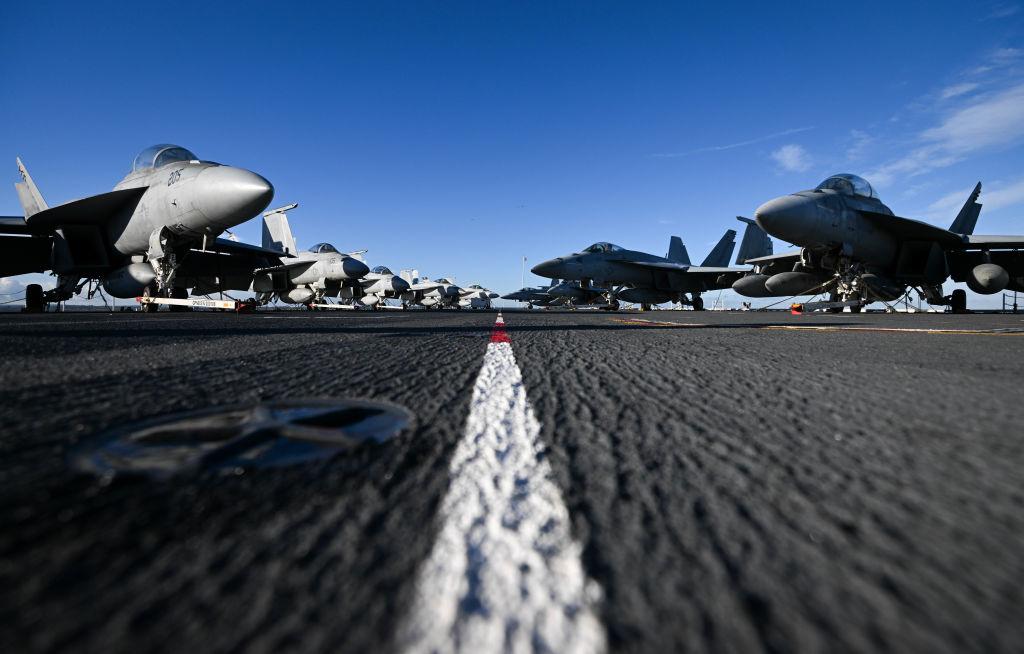
Sea state
Japan is fast-tracking its acquisition of US-made Tomahawk cruise missiles, aiming for as early as 2025. The decision, announced by Japanese Defense Minister Kihara Minoru following talks with his US counterpart, Defense Secretary Lloyd Austin, is driven by heightened security concerns in the Taiwan Strait. To achieve the accelerated timeline, Japan will convert half of its initially planned 400 Block V missiles to the Block IV variant for deployment on its Maritime Self-Defence Force’s Aegis-equipped destroyers.
A US carrier strike group has been deployed to the eastern Mediterranean Sea to assist Israel following the weekend’s surprise attack by Hamas. The commander of US Central Command, General Michael Kurilla, said: ‘The arrival of these highly capable forces to the region is a strong signal of deterrence should any actor hostile to Israel consider trying to take advantage of this situation.’ Among the deployment’s aims are to prevent additional weapons from reaching Hamas and to collect surveillance. The US is also augmenting its fighter aircraft squadrons in the region.
Flight path
A British Airways flight bound for Israel from London has been forced to turn back mid-air as Hamas launched missile strikes on Ben Gurion Airport in Tel Aviv. Governments around the world have been racing to evacuate their citizens from Israel as the security situation deteriorates in the wake of Hamas’s attack. Australia’s prime minister, Anthony Albanese, announced on Wednesday that two emergency Qantas flights had been organised for Friday to brings Australians back home, and arrangements are being made for a third flight next week.
US warplanes have downed a Turkish drone near the town of Hasakah in northern Syria. The incident came amid Turkish strikes against Kurdish forces in Syria following a suicide bombing in Ankara claimed by the Kurdistan workers’ party. US troops observed drones conducting raids inside a declared US restricted operating zone, and when a Turkish drone flew towards the US forces, F-16 fighters took defensive action. US Defence Secretary Lloyd Austin has since spoken with his Turkish counterpart, stressing the importance of de-escalation and adherence to deconfliction protocols in northern Syria.
Rapid fire
The US Army has accepted the first delivery of its long-delayed next-generation engines being developed by General Electric Aerospace as part of its improved turbine engine program. They were supposed to be delivered last year, but delays blamed on manufacturing and supply-chain issues pushed the target date back. The engines are set to power the army’s future attack reconnaissance aircraft and AH-64 Apache and UH-60 Black Hawk helicopters, with the first flight using the engine expected in 2024.
The Swedish army is supporting police efforts to combat a recent surge of gang killings in Sweden. The army is providing specialist skills with explosives, helicopter logistics and high-tech forensic analysis. In September alone, 12 people were killed in gang-related events in Sweden, with one killed by a bomb attack and another 11 shot dead in separate incidents. Swedish Prime Minister Ulf Kristersson has blamed the crisis on years of political naivety, stating that ‘irresponsible immigration policy’ and ‘failed integration … brought us here’.
Final frontier
China has announced plans to expand its Tiangong space station from three to six modules to allow the 180-tonne station to hold up to four astronauts. This effort aligns with Chinese ambitions to conduct lunar and deep space missions this decade.
The US Air Force has awarded a US$98 million contract to Virginia-based consulting firm Logistics Management Institute to develop space wargaming software. The company will provide its ‘rapid analysis and prototyping toolkit for resiliency’ to support the US Space Force’s space security and defence program and Space Warfighting Analysis Center. The contract is a step forward for the US in its approach to protecting space assets in degraded operating environments, likely building on lessons learned from two recent wargames.
Wired watchtower
Users of X (formerly Twitter) have faced a flood of disinformation in the wake of the surprise attack by Hamas on Israel over the weekend. Mislabelled videos and unverified images shared online by verified accounts have outpaced and displaced trustworthy information. X has long played a pivotal role in lifting the digital ‘fog of war’ during conflicts but has increasingly relied on user self-regulation for content moderation. Israel’s National Cyber Directorate and the Anti-Defamation League have raised concerns about the spread of false and anti-Semitic claims on the platform.
Pro-Russian hacking group Killnet and the IT Army of Ukraine have agreed to comply with new rules of engagement for non-combatants published by the International Committee of the Red Cross. Dubbed a ‘Geneva code of cyber war’, the eight rules include bans on attacking hospitals and humanitarian facilities, proliferating hacking tools and creating terror among civilians. While not all hacktivists have agreed to follow the rules, the move may help deter some from joining patriotic cyber gangs to engage in digital conflict.